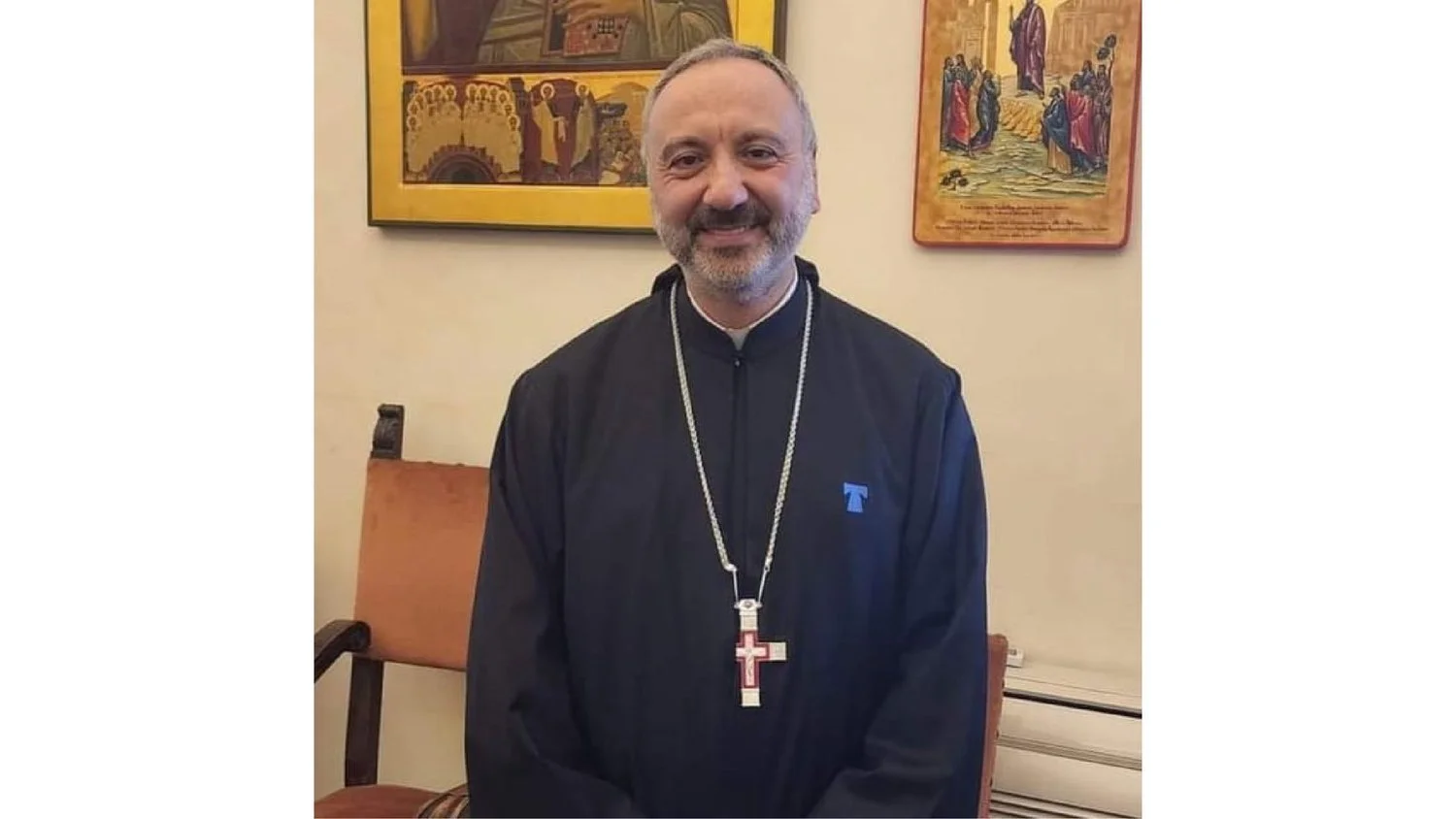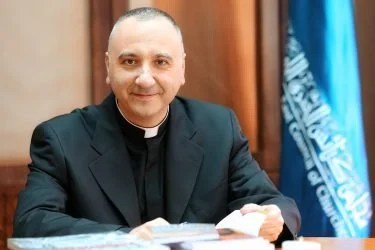Weeks Prior to His Episcopal Ordination, His Eminence Bishop Michel Jalakh in an Exclusive Interview
Reconciliation can only be achieved through direct dialogue between the churches
We must strengthen the Christian presence in the region through steadfastness and Prayer
Without MECC we would remain dispersed Churches
Exclusive the Middle East Council of Churches (MECC)
“Well done, good and faithful servant! You have been faithful with a few things; I will put you in charge of many things. Come and share your master’s happiness!” (Matthew 25: 23)
The Lebanese Antonine Monk His Eminence Archbishop Michel Jalakh is taking on greater responsibilities, and serving the Church of Christ remains his motto forever.
Archbishop Jalakh, Honorary Secretary General of the Middle East Council of Churches (MECC), and its Secretary General from 2013 to 2018, was elevated by His Holiness Pope Francis in March 2024 to the Episcopal Rank with the title of “Titular Archbishop of Nisibis”. Blessed Service!
With the blessings of His Beatitude Patriarch Cardinal Mar Bechara Boutros Al-Rai, Maronite Patriarch of Antioch and All the East, he will be ordained Archbishop on Saturday 8 June 2024, in the Patriarchal Edifice - Bkerke, Lebanon.
Archbishop Michel Jalakh chose to store up for himself treasures in heaven. Despite his awareness of the difficulty of this path, his solid faith and determination confirm that gates of hell shall not prevail against the work of the Holy Spirit. He is the first Maronite and Lebanese to receive, in February 2023, the position of Secretary of the Dicastery of the Eastern Churches from its founding in 1917 until now, where he was also appointed as an Advisor to the Dicastery for Promoting Christian Unity in the Holy See.
Biography of His Eminence Archbishop Jalakh
Archbishop Jalakh entered the Antonine Order in 1977, where he professed his vows in 1985. He studied philosophy and Theology at the Pontifical University of Saint Thomas Aquinas in Rome, and was ordained a Priest in 1991. He was appointed Administrative Agent for the properties of the Antonine Order in Rome from 1993 until 2005, and Deputy General of the Holy See in 1999. In addition, he served in the Dicastery of the Eastern Churches for eight years until 2008, when he returned to Lebanon and assumed the financial management at the Monastery of Saint John Ajaltoun and its school within three years. He was elected Secretary General of the Middle East Council of Churches in 2013 and continued in this position until 2018. Noting that in 2017 the Monastic Council appointed him President of the Antonine University in Lebanon, where he worked to develop the university until 2023.
Archbishop Jalakh is a university professor of Church sciences and ecumenism, and a member of the Saint Irenaeus Joint International Orthodox-Catholic Working Group. He received a piano degree in 1996 and a doctorate in Eastern Ecclesiastical sciences from Rome in 2008. He has written several books on Ecclesiology, ecumenical dialogue, and the issue of the Christians of the East.
New responsibilities and great challenges
In an exclusive interview made by the MECC Communication and Public Relations Department with His Eminence Archbishop Michel Jalakh, His Eminence answered many questions about his new responsibilities. Other topics were also discussed such as the challenges of ecumenical work and the issue of the Christian presence in the Middle East.
“Service and ecumenism” is a pledge that Archbishop Jalakh embodies through knowledge and work in his life and career. After His Holiness Pope Francis elevated him to the Episcopal rank, the Titular Archbishop of Nisibis has new concerns as he seeks, with much hope, to consolidate the word of Christ and strengthen the bonds of love and brotherhood among believers in various parts of the earth. With the multiplication of responsibilities, Archbishop Jalakh points out that the concern for service in his work has become greater and deeper.
He adds, “ecumenism is another concern that we always carry. In every letter I sign, every work I do, every Sermon I address, every academic intervention I give, and every time I represent the Dicastery of the Eastern Churches as a second official, ecumenism always remains present. I take into account the ecumenical dimension in every word I write, every letter or book I sign, or every work I make.”
The Dicastery of the Eastern Churches in the Vatican
The Secretary of the Dicastery of the Eastern Churches in the Vatican is fully aware that the Church in the Middle East and the world faces great difficulties in a world plagued by conflicts, wars, and hate speech. But in light of all these challenges, what are the tasks of the Dicastery of the Eastern Churches in the Vatican? What role does Archbishop Jalakh take?
The Lebanese Monk explains that the Dicastery of the Eastern Churches in the Vatican is concerned with the issues of the Eastern Catholic Churches. It consists of 23 Catholic Churches extending geographically from North and South Africa, Eritrea, Ethiopia, and all the Catholic Churches of the Middle East to Central and Eastern Europe, that is, Ukraine, Romania, Moldova, and Serbia... to the Sroumalambar and Sroumalankar Syriac Churches at the South of India. The Dicastery’s tasks lie in following up on Ecclesiastical, financial and administrative issues related to existing difficulties, in addition to Bishops' elections, financial aid, relations between these Churches and His Holiness Pope Francis, as well as Ritual and Liturgical books...
The Dicastery, as all other Dicasteries in the Vatican, includes three officials: the Cardinal or President, the Secretary, and the Assistant Secretary. Archbishop Jalakh points out that he is “the second person after the Cardinal, as we coordinate and deal with all issues related to the Dicastery, together with the Assistant Secretary, and then distribute the tasks to concerned employees, who are 27 in the Diacstery. Among them are about 15 Priests, and about 12 lay people. My tasks are to review all the issues related to the Eastern Catholic Churches and take appropriate decisions and solutions for them.”
Dicastery for Promoting Christian Unity in the Vatican
Archbishop Jalakh’s work is not only serving the Eastern Catholic Churches, but also in striving to strengthen the ecumenical spirit in order to fulfill the commandment of Jesus Christ, “that all of them may be one, Father, just as you are in me and I am in you” (John 17: 21). In this context, and as an Advisor to the Dicastery for Promoting Christian Unity in the Vatican, Archbishop Jalakh is in charge of studying some of the issues that this Dicastery addresses.
Hence, Archbishop Jalakh explains that the Dicastery for Promoting Christian Unity was born in the Second Vatican Council as a secretariat, after which it witnessed new development and became an independent department with a President and assistants and a direct relationship with the Supreme Pontiff. Through this Dicastery, the dialogue between the Vatican Church in Rome and other Churches was launched. It began in a preliminary manner in the year 1964, especially with the meeting of Pope Paul VI and the Patriarch of Constantinople in the Holy Land. The Dicastery also witnessed many dialogues of love from 1965 to 1980, after which several dialogue committees were established between the Catholic Church and the other non-Catholic Christian Families, taking into account the specificities of the local and ethnic Orthodox Churches and other Churches.
Archbishop Jalakh continues, “By virtue of my responsibility and service in the Dicastery of the Eastern Churches in the Vatican, His Holiness Pope Francis appointed me as an Advisor in the Department for Promoting Christian Unity to review the issues related to the Eastern Catholic and Orthodox Churches and work to address them. I study the files that I receive and present my necessary opinions, as I am also invited to participate in the General Assembly held by the Dicastery.”
Dialogue and ecumenical work
In light of all the ongoing efforts to build bridges between Churches, what is the importance of dialogue programs that are held between them? Are there any positive results from it? Archbishop Jalakh answers, “Reconciliation cannot be achieved except through direct dialogue that contributes to bridging the distances between Churches, and without that we cannot reach unity among Christians. Dialogue programs help enhance communication and rapprochement between Churches, and this is what reduces prejudices.
When we get to know the other, his thoughts, his life, his way of living, and his view of the Church, we can recognize all the positive things in him and in his faith. Reconciliation requires a lot of time, years, and Prayer, and it is not only achieved through dialogues, but through the work of the Holy Spirit in the heart of the Church. Our role is to listen to the calls of the Holy Spirit.”
He added, "We have great hope for the issue of Christian unity, but we must be realistic. This issue remains a concern, and we will continue to carry the concern for unity that Jesus Christ commanded us through His Priestly Prayer in the Gospel of John. My aspiration is that we continue to carry the issue of Christian unity in our lives, Prayers, and spirituality."
Christian unity in the Middle East
What are the conditions of the issue of Christian unity and the ecumenical work in the Middle East? Archbishop Jalakh points out that “Theological dialogue seems to be at the bottom of the list of priorities. What distinguishes ecumenical work in the Middle East is love through working together and Praying together, which is often embodied in a week of Prayer for Christian unity. What also distinguishes Churches in the Middle East is accepting the other and mixing, whether through coexistence, schools, universities, or marriages. Therefore, it is necessary to work to reduce absurdity and sarcasm among us, raise awareness about the ecumenical issue, and rely on God, who is the Founder of the church and its First and Last responsible.”
Hence, as a result of the difficult living conditions that the people of the Middle East are going through as a result of the various crises that are burdening them, the Christian presence in the region has become threatened with danger. In this context, Archbishop Jalakh says, “The Churches of the Middle East are among the Churches in the world that are most suffering and tormented. We can strengthen the Christian presence in the region through steadfastness and insistence on survival and on our belief in the Resurrection after the Passion, as well as being aware of our role and mission in this Holy land. We must continue to Pray, raise awareness, and consolidate our faith in our Lord because this land is sacred. If we die or be martyred, we will be martyred in the name of the Church that remains alive.”
In conclusion, and on the occasion of the Fiftieth Year of the Founding of the Middle East Council of Churches (MECC), His Eminence Archbishop Michel Jalakh wishes the Council many years of success and says, “The Middle East Council of Churches is very dear and means a lot to me. I spent 5 years in it, where I worked from my heart and loved it very much. We must preserve it with all our strength, because without it we remain dispersed Churches. In the past, MECC faced many difficulties, like all other institutions, so we must keep our efforts in order to help the Council continues to perform its important role.”












